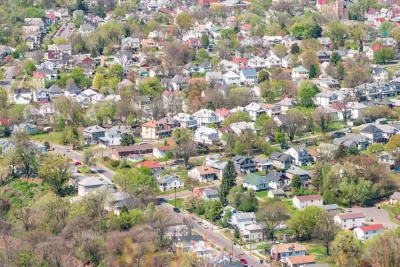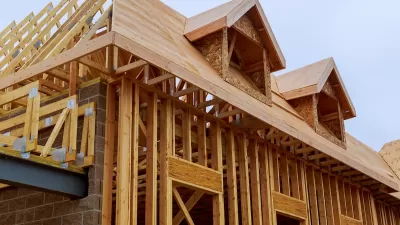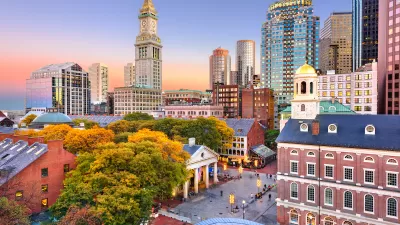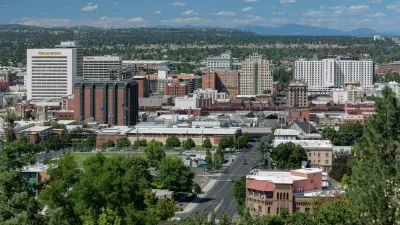As the state's real estate costs rise, community land trusts struggle to access funding and land in order to build more affordable housing.

The rapid rise in housing costs in Northern Virginia's Blacksburg "has sent local officials searching for solutions, making the town of just 15,000 permanent residents the latest Virginia locality to experiment with a community land trust," according to Wyatt Gordon of Greater Greater Washington. Kim Thurlow, who works with the Town of Blacksburg on housing initiatives, says demand is high while supply is limited. "We are a small college town experiencing really rapid growth due to the university, the former alumni that see our area as a potential investment and of course the innovative businesses that are being spun off from the university. If you’re a first time home buyer, you’re getting squeezed out of town."
But a recent initiative that created a community land trust has stalled due to a lack of fundraising capacity. While "[t]here are a number of potential funding sources for the housing development side," Thurlow says, "none of them are set up to pay for the operational costs needed to have a staff that would offer support to the homeowner long-term."
CLTs maintain affordability by never selling the land underneath the housing and splitting the earned equity with the homeowner when they sell the structure. Although the model developed in rural Georgia as a way for Black farmers to protect their land from the forced sales and seizures which have long hindered people of color from accruing wealth in this country, CLTs have only recently made their way to Virginia via the movement for affordable housing.
Acknowledging the uneven pace of growth between home prices and wages, "[t]he community land trust model creates homes that are not allowed to increase in cost at the same pace as the market," says Julia McNally, program director for the Virginia Statewide CLT, the state's third such entity and the only one not focused on one specific community.
While acquiring land is expensive and difficult for CLTs, cities can help by donating or selling low-cost parcels of land to the land trusts. According to Erica Sims, CEO of the Maggie Walker CLT, "[m]unicipal contributions of land are so important because that takes one of our biggest costs of providing more affordable housing out of the equation."
To improve their prospects, Virginia CLTs are now pushing for a real estate tax exemption that would further reduce costs for CLTs and allow them to build more affordable housing at a lower cost.
FULL STORY: Can community land trusts help solve Virginia’s housing crisis?

Study: Maui’s Plan to Convert Vacation Rentals to Long-Term Housing Could Cause Nearly $1 Billion Economic Loss
The plan would reduce visitor accommodation by 25,% resulting in 1,900 jobs lost.

North Texas Transit Leaders Tout Benefits of TOD for Growing Region
At a summit focused on transit-oriented development, policymakers discussed how North Texas’ expanded light rail system can serve as a tool for economic growth.

Using Old Oil and Gas Wells for Green Energy Storage
Penn State researchers have found that repurposing abandoned oil and gas wells for geothermal-assisted compressed-air energy storage can boost efficiency, reduce environmental risks, and support clean energy and job transitions.

Private Donations Propel Early Restoration of Palisades Playground
Los Angeles has secured over $1.3 million in private funding to restore the Pacific Palisades playground months ahead of schedule, creating a modern, accessible space that supports community healing after recent wildfires.

From Blight to Benefit: Early Results From California’s Equitable Cleanup Program
The Equitable Community Revitalization Grant (ECRG) program is reshaping brownfield redevelopment by prioritizing projects in low-income and environmental justice communities, emphasizing equity, transparency, and community benefits.

Planting Relief: Tackling Las Vegas Heat One Tree at a Time
Nevada Plants, a Las Vegas-based nonprofit, is combating the city’s extreme urban heat by giving away trees to residents in underserved neighborhoods, promoting shade, sustainability, and community health.
Urban Design for Planners 1: Software Tools
This six-course series explores essential urban design concepts using open source software and equips planners with the tools they need to participate fully in the urban design process.
Planning for Universal Design
Learn the tools for implementing Universal Design in planning regulations.
Ascent Environmental
Borough of Carlisle
Institute for Housing and Urban Development Studies (IHS)
City of Grandview
Harvard GSD Executive Education
Toledo-Lucas County Plan Commissions
Salt Lake City
NYU Wagner Graduate School of Public Service





























